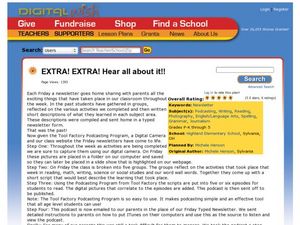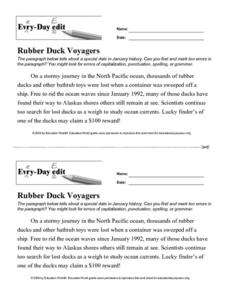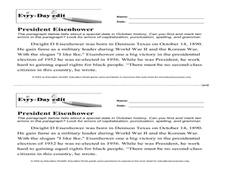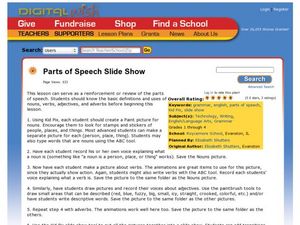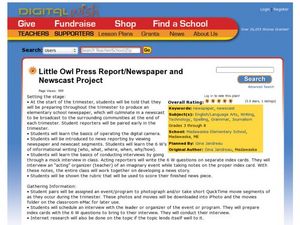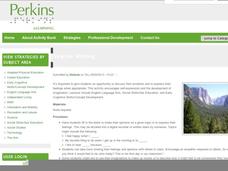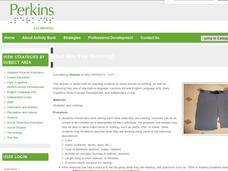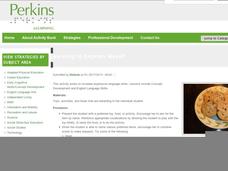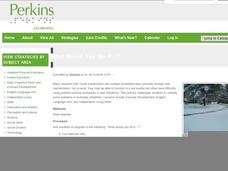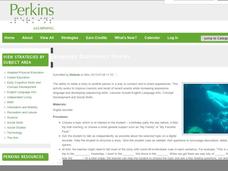Curated OER
Extra! Extra! Hear All About It!
Students summarize their weekly class activities by writing a newsletter. In this journalism lesson, students create a multimedia presentation for their parents based on the classroom events that took place during the week. Students...
Curated OER
Understanding Characters
Young scholars analyzing characters from a story by creating an article about one. In this story analysis lesson, students read Charlie and the Chocolate Factory by Roald Dahl, and pick one character to write descriptively about. Young...
Education World
Every-day Edit: Rubber Duck Voyagers
Learners correct errors in spelling and usage in a quick, six-line proofreading exercise. Makes a nice warm-up and reinforces editing skills. I've seen work like this called Daily Oral Language (D.O.L) practice; the class reviews the...
Education World
Every-day Edit: Hobo Turned Poet
Pupils proofread a short paragraph about Carl Sandburg. The errors span capitalization, punctuation, spelling, and grammar. Useful as a warm-up and language conventions review. Go over it together as a class verbally and have individual...
Education World
Every Day Edit - Sir Isaac Newton
Practice everyday! Have learners correct grammatical errors in a short paragraph about Sir Isaac Newton. The errors are in capitalization, punctuation, spelling, and grammar.
Education World
Every Day Edit - President Eisenhower
What do you know about Dwight D. Eisenhower? Learn about President Eisenhower while editing a half-sheet. Learners correct grammatical and spelling mistakes in the short paragraph.
Curated OER
Density - An Intrinsic Property
Learners discover the property of density while participating in a lab exercise. For this scientific measuring lesson, pupils utilize a scale to measure the density of different metal materials. They document their work and present their...
Curated OER
Parts of Speech Slide Show
Review the parts of speech. English Langugae Learners use KidPix to create a paint picture for nouns, verbs, and adjectives. They use the KidPix slideshow tool to construct a slideshow of their work.
Curated OER
Little Owl Press Report/Newspaper and Newscast Project
Discover journalistic techniques by having learners prepare and write their own class newspaper. They discuss the five W's of investigative journalism and conduct interviews with school figures. They utilize video technology, podcast...
Curated OER
Animal Sounds: The Three Little Pigs
Intended for use with the story of The Three Little Pigs, this resource offers special-needs individuals an opportunity to boost verbal skills and word recognition. Each page includes both words and vivid images to enhance the learning...
Perkins School for the Blind
Familiar Sounds
To foster concept development and auditory discrimination skills, learners with visual impairments listen to identify a variety of common sounds. The teacher makes recordings of various sounds, including those found in the home, at the...
Perkins School for the Blind
What Do I Hear?
Being able to give positive reinforcers to a child starts with knowing what the child likes. Intended for children with blindness, this lesson gives you a way to determine the types of music your learners like best. You are given a set...
Perkins School for the Blind
Prepositions
When most children learn about prepositions, they are provided with a visual to show them the concepts of on, in, near, and beside. For learners with visual impairments, concepts need to be constructed in a very concrete way. A stuffed...
Perkins School for the Blind
Encouraging Students Who are Blind or Visually Impaired to Express Their Feelings and Explore Imagination
Being expressive in a creative, empathetic, or imaginative way is not only fun, it builds good pre-writing and communication skills. Learners with visual impairments have a roundtable discussion session where several sentence frames are...
Perkins School for the Blind
Learning Names of Articles of Clothing
What to wear today; such a vexing question. Spend some time introducing the names, fabrics, types, colors, and functions of various articles of clothing to your class. Each child will take turns asking each other what they are wearing....
Perkins School for the Blind
Learning to Express Myself
Expressing one's wants and needs is vital for learners of any age or ability level. Young children with visual impairments and intellectual disabilities practice asking for preferred items, foods, or activities in a structured manner....
Perkins School for the Blind
Conversation Skills
It is so important for learners with multiple disabilities to learn how to communicate for both social and functional reasons. Each child will choose a topic from the list and generate five questions related to that topic. They'll split...
Perkins School for the Blind
Circle Time
Oftentimes children or teens with one or more disability are reluctant to participate in whole-group activities. Foster good participation, verbal expression, and social skills through daily circle time activities. Each day you and your...
Perkins School for the Blind
Personal Information
"Hi, how are you? My name is___." Seems simple enough but it's not always that easy to recall and relate factual information about yourself. Learners with multiple disabilities practice memorizing and relaying personal information about...
Perkins School for the Blind
What Would You Do If...?
What would you do if...? That's a great question, and, when posed to learners with visual impairments, a question that can foster concept development and speaking and problem-solving skills that relate to real-life situations. The...
Perkins School for the Blind
I'm Thinking Of...
Learning how to describe an object or a person is a great way to develop verbal and written expression. Learners with special needs improve their verbal expressive skills and concept development skills while playing a guessing game. The...
Perkins School for the Blind
Treasure Hunt
On, over, and under are some very common prepositions; but how can you teach these concepts to children with visual impairments? Here, is one way. Kids will practice following verbal commands as they go on a classroom treasure hunt. They...
Perkins School for the Blind
Where Shall I Put It?
Position and positional phrases are concepts that need to be constructed for learners with low or no vision. Help them gain competence and a conceptual understanding of words like on, in, and under with a funny game. After gathering a...
Perkins School for the Blind
Language Experience Stories
Here is a great way to bring core content to your special education classroom. Included is a set of instructional ideas intended to help learners increase their verbal and written expression through storytelling. Tape recorders, story...
Other popular searches
- Class Newsletter
- Bill of Rights Newsletter
- Creating a Newsletter
- Newsletter Template
- Classroom Newsletters
- Autobiographies Newsletter
- Creating Newsletter
- Newsletter Writing
- Writing a Family Newsletter
- Back to School Newsletters
- Newsletter on Computer
- Student Newsletters


